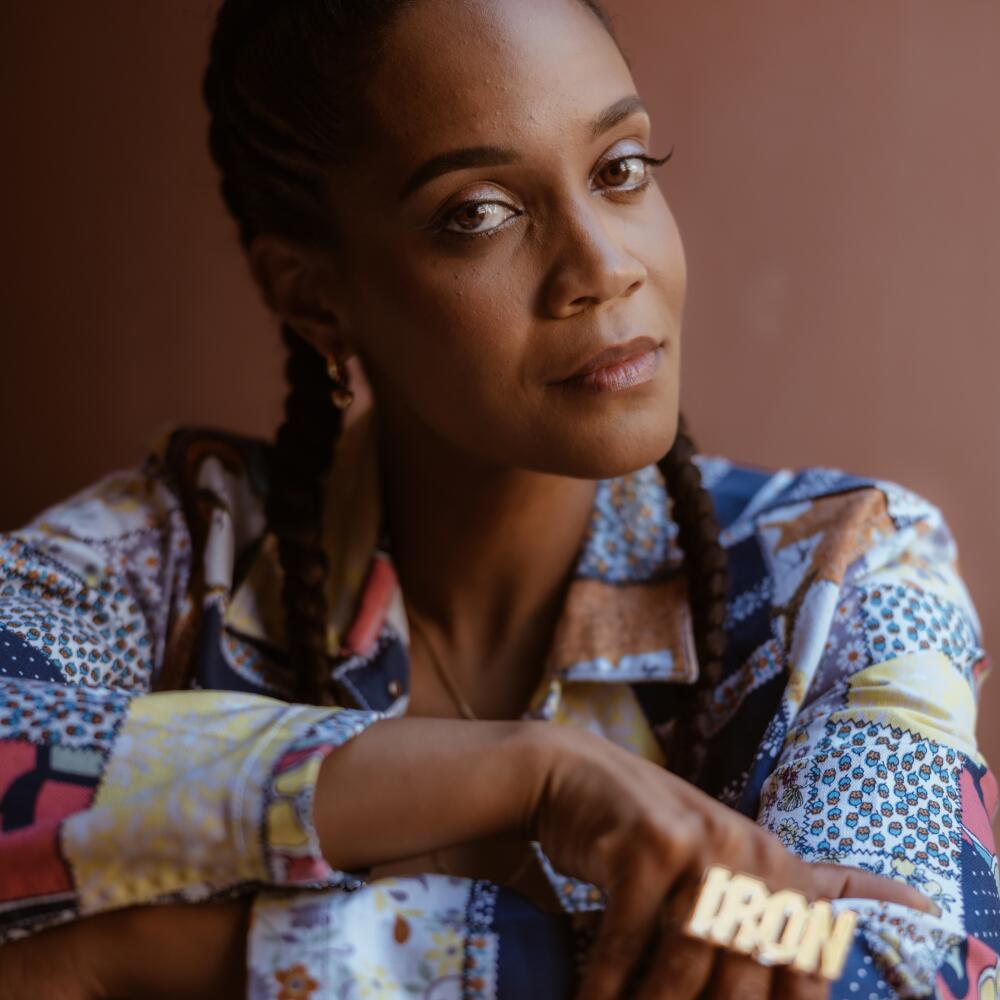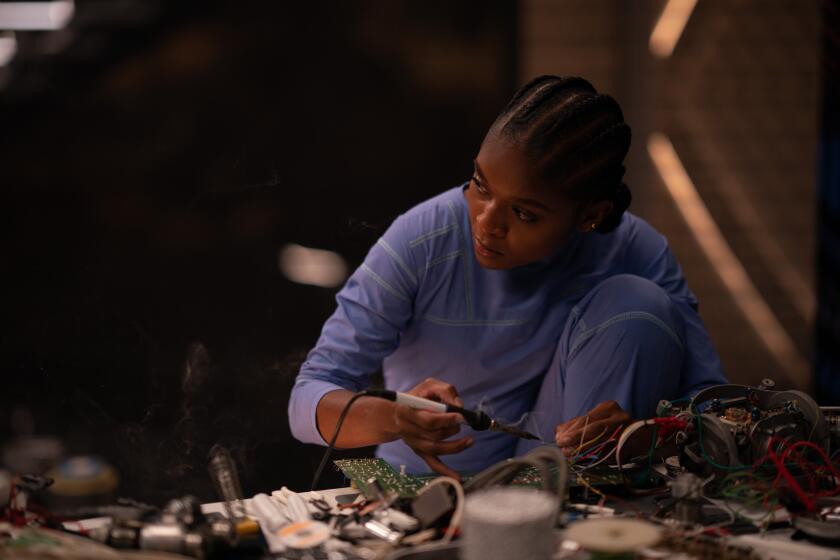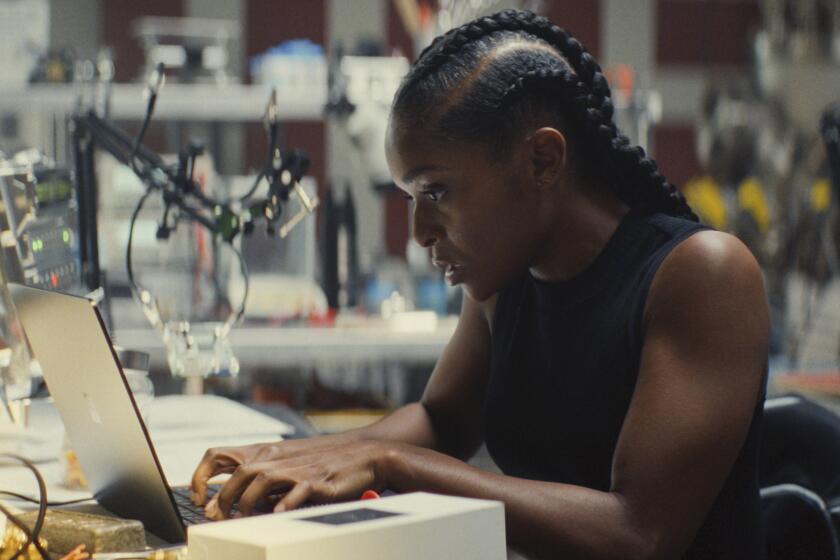
- Share via
For Chinaka Hodge, it’s important that Riri Williams is unapologetic.
Comparing the young engineering prodigy to the billionaire tech CEO and Avengers founding member Tony Stark, the head writer and executive producer of Marvel’s “Ironheart” says she wanted her show’s lead character to share some of that brash confidence to speak her mind yet still feel grounded.
“I wanted her to be unapologetic about her intellect,” says Hodge during a recent Zoom call. “I wanted her to be unapologetic about the people she hung out with — that they would look and feel like the America we inhabit.
“It was really important to me to make a character that didn’t just feel like a superhero in a skirt [but someone with] real dimension, real depth and real challenges and concerns,” she added.
Williams, a.k.a. Ironheart, makes her live-action debut in ‘Wakanda Forever,’ played by Dominique Thorne. Here’s what to know about the teen genius.
Out now on Disney+, “Ironheart” follows Riri (portrayed by Dominique Thorne), a 19-year old MIT student introduced in the 2022 film “Black Panther: Wakanda Forever,” as she finds herself back in her hometown of Chicago.
After getting whisked away to Wakanda to help save the day, Riri is more driven than ever to complete her own version of a high-tech Iron Man-like suit to cement her legacy. But unlike Tony or the Wakandans, Riri doesn’t have unlimited resources to do so, which leads her to make some questionable decisions.

“She’s incredibly reverent of Tony Stark [being] ahead of her, but her path is not the same as his,” says Hodge, who can relate to Riri having “no blueprint” for her journey. “How to empower your idea without resource, without changing your morals, is a really difficult road, and that’s basically where we put Riri for the life of the series.”
Compared to most of her Marvel Cinematic Universe counterparts, Riri is a fairly new character. Created by Brian Michael Bendis and Mike Deodato, the 15-year-old tech whiz made her comic book debut in a 2016 issue of “Invincible Iron Man.” Besides Tony Stark, Riri has crossed paths with characters such as Pepper Potts (Rescue), Kamala Khan (Ms. Marvel) and Miles Morales (Spider-Man).
A self-described “Marvel head,” Hodge explains that Riri initially hit her radar because of her friendship with fellow poet and scholar Eve Ewing, who was the writer on the first “Ironheart” comic book series.
“My first encounter with Riri was watching Eve literally leave a poetry [event] and say, ‘I have to go to my house … I’m working on some cool things,’” Hodge says. “In a true fan kind of way, I’m interested in characters that look like me, and low-key, Riri really looks like me, [so] I very much leaned in.”

As she became more familiar with the character, what also struck Hodge, as someone on the autism spectrum, is how Riri can be read as neurodiverse. “One of the most important things about Riri [is] how she feels like me and my mom and other women who lean into their brains,” she says.
Fans of Ironheart from the comics will recognize that elements of Riri’s characterization and backstory draw upon what has been established in the books, but Hodge notes that they were not beholden to those storylines in terms of whom the teen could encounter on the show, regardless of the timeline or dimension. Hodge’s learning curve, however, did include discovering the different levels and types of magic that exist in the broader Marvel universe, as well as potential storylines getting derailed because it fell under another character’s purview.
Though she is still a teen genius, the Riri in the series is slightly older than in the comics. Hodge also describes this Riri as more of an antihero because she has the potential to land on either side of the hero/villain line based on the choices she makes.
Riri Williams doesn’t have time for doubters in the first ‘Ironheart’ trailer, where the young genius declares she wants to build something ‘iconic.’
Hodge, along with “Ironheart” directors Sam Bailey and Angela Barnes, sing Thorne’s praises, for her portrayal of Riri and as a collaborator. Hodge calls the Cornell-educated actor “a genius” and says she strove to pull Riri’s dialogue up to the level of Thorne’s intellect, rather than the other way around. Bailey, who directed the first three episodes of the series, says Thorne “brought such a soulfulness to the character.” And Barnes, who directed Episodes 4 through 6, commends her capacity to be present for her fellow actors.
“It was exciting to just create the environment to let her do her thing and feel safe within doing that,” Bailey says.
“Ironheart” marks the first time the MCU has spotlighted Chicago, and for the show’s creative team, it was important to get the city right. Hodge, who grew up in Oakland, admits that while she may not have direct knowledge as an outsider, she can relate to how Riri regards her home and wanted to treat the city with respect.
“Chicago’s my favorite cast member,” Hodge says. “I think Riri feels about Chicago how I feel about Oakland. It’s a hometown, but it’s [also] a legacy we’re carrying. Us being from there means something if we do something right with our lives.”
That type of hometown pride was shared by many in the “Ironheart” cast and crew. Hodge says the aim was to tap as many Chicago artists and musicians — from local bucket drummers to cast members like Shea Couleé — to capture the true texture of the city. Among those with strong personal ties to the city is Bailey, who is from Chicago, and Hodge credits the director with helping to bring their vision to life.

“I feel like Chicago has this beautiful chip on its shoulder,” Bailey says. “We don’t trust a lot of people. We’re very protective of the city and its inhabitants. … There was a bit of rebelliousness I wanted to capture … and the different types of people that populate that city, which I don’t feel like we get to see a lot onscreen.”
As the director of the first half of the series, Bailey’s goal was to set up the backstory and establish the vibrancy of everyone introduced in the early episodes to prepare for the adventure to come.
“It was really important to really make these characters feel like people and feel like people you wanted to be around and feel like people you want to root for,” says Bailey.
Among these characters in Riri’s orbit are those she shares a history with, like her mother, Ronnie (Anji White), her close friend Xavier (Matthew Elam) and even the neighborhood’s youngest businessman, Landon (Harper Anthony). But Riri soon finds herself in the company of a new crew led by Parker Robbins (Anthony Ramos), who some might compare to Robin Hood or a freedom fighter, at least initially.
Mindful of spoilers, Barnes only teases that the second half of the series involves Riri having to face some of the consequences of choices she made in earlier episodes.
“[Riri] made this decision to maybe hang out with people that aren’t necessarily the most savory of people,” says Barnes. “They also have their own reasons for doing what they’re doing, but … she gets in a little deeper than she imagined.”
A self-proclaimed MCU fan, Barnes emphasizes how the show was intentional in everything from its set pieces to decoration, including how the design for the heads-up display of Riri’s suit was inspired by infographics from the works of W.E.B. Du Bois. But she also recalls the fun they had during production, like flipping a truck and building a White Castle in a parking lot.

For Hodge, “Ironheart” marks one of her highest-profile projects to date. The poet and playwright turned to screenwriting after realizing she wanted to expand beyond working in first person and enrolled in USC’s graduate film school in 2010. There, she’d meet fellow student filmmakers like “Black Panther’s” Ryan Coogler, who is an executive producer on “Ironheart,” and “Creed II’s” Steven Caple Jr. (“I would just follow Ryan around campus [saying], ‘Hire me,’” she says. He eventually did.)
Among the things Hodge was excited about while working on the series was getting to explore larger themes around access, autonomy and safety through specific situations that consider how a young girl from Chicago’s South Side might be perceived differently than Tony Stark for owning a weapons-grade tech suit because of what they look like. She was also eager to populate the show with people who reflect the diversity of the real world.
Broadly speaking, “you’re gonna see yourself if you turn on the screen on this show,” says Hodge, who is glad the MCU has moved to “feel like a universe that’s inhabited by the people who read publishing and go to the movies.”
“I’m excited for the little, quirky Black girl watching the show who sees herself in it [and] for the queer kid who finds it for their Pride Month activities and wants to watch it,” she says. “I’m really excited for that Black boy who wants to play with a Riri Williams action figure and finds it in the store and gets to fly it around his own house. I’m excited and I’m nervous [and] thrilled, and I feel like that’s exactly how Riri feels when she’s flying over the Chicago skyline.”
More to Read
The complete guide to home viewing
Get Screen Gab for everything about the TV shows and streaming movies everyone’s talking about.
You may occasionally receive promotional content from the Los Angeles Times.









